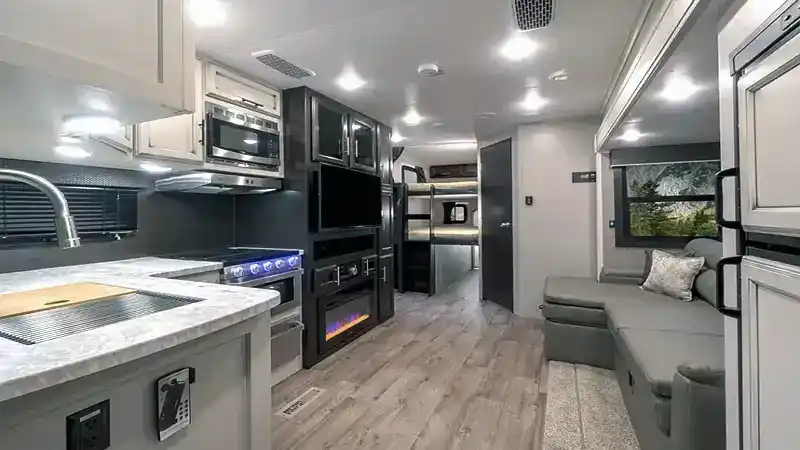
Thank you for reading our post, please rate this article at the end.
Reading Time: 10 minutesLast Updated on November 12, 2025 by Paul Clayton
Table of Contents
Gas vs Diesel RV Costs and Advantages
Key Takeaways
-
- Price and Resale Value
- Gas RVs: Significantly cheaper upfront, making them ideal for first-time buyers or those on a tight budget.
- Diesel RVs: Much more expensive initially, but they retain their value longer and offer a higher resale value due to superior durability.
- Fuel Efficiency and Accessibility
- Gas RVs: Use cheaper and more widely available fuel, which is advantageous for travel in remote areas. However, gas engines are less fuel-efficient and require more frequent fill-ups.
- Diesel RVs: Offer better overall fuel efficiency in the long run due to the higher energy value of diesel fuel.
- Power and Performance
- Diesel RVs: Possess superior torque and power, making them better suited for climbing steep inclines, maintaining speed on hills, and heavy-duty towing.
- Gas RVs: Have less torque, which can strain the engine when climbing and limit towing capacity.
- Maintenance and Repair
- Gas RVs: Maintenance and parts are generally cheaper, easier to access, and can often be serviced by less specialized mechanics (some general repairs can be DIY).
- Diesel RVs: Maintenance is less frequent, but parts are more specialized and repairs are significantly more technical and costly.
- Size, Storage, and Noise
- Diesel RVs: Are typically longer (up to 45 feet), feature a raised rail chassis for ample under-coach storage, and handle more weight/appliances. The rear-positioned engine also results in a much lower noise level in the cockpit.
- Gas RVs: Are shorter, making them easier to maneuver in campgrounds and gas stations. They have less storage space due to a straight-rail chassis, and the front-positioned engine makes them noisier.
- Durability and Lifespan
- Diesel RVs: Have a longer engine life, often lasting 200,000 to 300,000 miles before needing a rebuild, making them ideal for full-time or commercial use.
- Gas RVs: Typically last 100,000 to 200,000 miles with good maintenance.
- Price and Resale Value
Frequently Asked Questions
Q: What is the primary difference in upfront cost and long-term investment between gas and diesel RVs?
A: Gas RVs are significantly cheaper to purchase initially, making them more budget-friendly. Diesel RVs are much more expensive upfront but are often considered a better long-term investment because they retain their value longer due to superior durability and a longer engine lifespan, leading to higher resale value.
Q: Which type of RV is better suited for driving in mountainous terrain or towing heavy loads?
A: Diesel RVs are better for these purposes. They offer superior torque and power, making climbing steep inclines easier, helping maintain speed on hills, and better accommodating heavy-duty towing without straining the engine.
Q: Is maintenance less frequent or less expensive for gas or diesel RVs?
A: Maintenance for diesel RVs is generally less frequent than for gas RVs. However, when repairs are needed, the maintenance and parts for diesel engines are significantly more technical and costly. Gas RV maintenance is more frequent, but much cheaper and easier to access.
Q: What is the typical engine lifespan for a gas RV versus a diesel RV?
A: Diesel RVs have a much longer engine lifespan, typically lasting 200,000 to 300,000 miles before a rebuild is necessary. Gas RV engines generally last for 100,000 to 200,000 miles with good maintenance.
Q: Which RV type offers a quieter driving experience and better maneuverability?
A: Diesel RVs offer a quieter cabin because their engines are typically located at the rear of the coach, minimizing noise in the cockpit. Gas RVs are shorter and easier to maneuver into campgrounds, boondocking spots, and fuel stations, offering greater travel freedom.
Gas vs Diesel RV Costs and Advantages
Regarding the open road, comfort and convenience are paramount, hence the rising popularity of RVs. The debate, “Gas vs Diesel RV – What is the Best Option and Why?” has various factors to consider. I have owned both. In this article, you will find essential facts about gas and diesel RVs to help you decide, so read on.
When buying an RV, you may need to skip the aesthetics and exteriors, as this can always be deliberated upon much later. Deciding whether you need a gas- or diesel-powered RV is essential to the best RV experience and should be your primary consideration.
About 15 years ago, there was no room to compare the two. Gas RVs could not comfortably climb mountains. They didn’t quite have the torque and horsepower, and you had to buy a diesel RV, which was way more expensive.
In today’s world, gas and diesel RVs are comparable. Thus, choosing between the two can be confusing and difficult. However, there are a few notable differences between gas RVs and diesel RVs that you must know about before you decide to buy either a gas RV or a diesel RV.
Gas vs Diesel RV Options to Consider
1. Price
For most first-time buyers, the price is an essential consideration. The RV you opt for will ultimately depend on your budget. You must understand that RVs are luxury vehicles and cost a lot.
You need to plan and save to afford one. Most people buy gas RVs because they are relatively cheaper than diesel RVs. Whether brand new or preloved, gas RVs are more affordable than used diesel RVs.
If you buy a brand-new diesel RV, you will pay way more than you would for a brand-new gas RV with similar features.
If you like this article, please check out our other RV articles here or our RV guides here.
While diesel RVs are on the higher side, they retain their value longer and can be a good investment for anyone seeking to RV for a long time. However, there are also high-quality, durable gas RVs that cost way more than the average gas RV.
Thus, you should consider your budget and RV lifestyle before deciding which RV to settle for. You can go with a gas RV if you have less money to spend on an RV. If you’ll be RVing for a long time, you might want to save and get a diesel RV.
It may cost more, but it also has a higher resale value. However, if you can’t afford one, you can start with the gasser and upgrade to a diesel RV later.
2. Fuel Economy and Fuel Efficiency
Gas not only costs less than diesel, but it is also easier to find. So, if your travel itinerary includes remote areas and new places, you can count on a gas RV. You will more likely stumble on gas than diesel at any fuel station.
Also, gas is cheaper than diesel, making gas RVs an affordable option for travelers on a budget. You can save money on fuel costs with a gas RV. So, if you’re driving your RV across the country or taking a budget vacation, you should consider getting a gas motorhome.
However, gas engines aren’t as fuel-efficient as diesel engines, making diesel RVs relatively cheaper in the long run. Gas RVs consume a lot of fuel, and you may find yourself at the fuel station more often.
Diesel RVs are more fuel-efficient because diesel fuel has a greater energy value than gasoline. Thus, it can sometimes offer a better fuel economy than gas RVs.
It is important to consider fuel efficiency before you buy an RV. RVs consume fuel at a high rate, and fuel is costly. You do not want your cross-country trips cut short because you ran out of fuel money.
3. Power
Diesel RVs are powerful due to their increased torque. This is notable when driving in mountainous areas. Driving a diesel RV up steep inclines is easier than driving a gas RV. You’ll also be able to maintain speed on an incline without going heavy on the throttle.
Gas RVs typically have less torque, which can strain the engine when climbing hills. It’s also difficult to maintain speed when climbing with gas RVs. If you’re traveling on slippery roads or towing with your RV, you should opt for a diesel RV, as it’s better suited.
4. Maintenance

Generally, maintaining an RV is expensive, but maintaining a diesel RV is even more so. Apart from oil and filter changes, the parts of diesel RVs are more expensive, and repairing a faulty diesel RV is also more costly.
You may need to empty your wallet to fix a diesel RV, especially when the fault is technical and requires extensive repair. Thus, consider opting for a gas RV if you have a tight budget. Gassers are generally affordable and cheaper to maintain. The parts are also not as expensive as diesel RVs and are easily accessible.
Also, fixing a gas RV requires less specialization and technical expertise. You’ll find places to service a gas RV efficiently, as more mechanics can work on gas RVs than diesel RVs.
Thus, if you need a quick repair, you can easily find someone to fix a gas RV. But for diesel RVs, you may need to wait longer and search harder before you find someone who can.
Gas RVs are not so complex. You can do general repairs on gas RVs if you know your way around a car’s engine. It’s essentially the same engine but bigger with a few modifications. This is a great advantage of gas RVs, as you can save money by fixing your RV yourself.
If you know how to change oil, you should be able to change the oil in a gas engine yourself. Diesel engines, on the other hand, are pretty complicated, and you may need to hire a professional to change the oil.
Also, diesel RVs have specialized parts and require specialized labor. Thus, you might find it challenging to reach service centers for your diesel RVs. There aren’t many qualified people who can properly service a diesel RV.
However, diesel RVs require less frequent maintenance than gas RVs, making maintenance costs comparable, though a gas RV is more economical.
5. Size
RV size is another essential factor to consider before buying an RV. The size you settle for will depend on what you intend to use it for.
Diesel RVs are longer. They can be up to 45 feet long and offer ample storage space. You can fit a lot into a diesel RV, which generally offers travelers a better traveling experience with spacious rooms and bigger windows to enjoy the view.
Because of their size, diesel RVs can take on more weight than gas RVs. You can fit refrigerators, washing machines, and other nice appliances to make your road trip comfortable. They support more weight than the average gas RV.
Gas RVs can’t handle much weight. They have limited capacity and cannot tow as much as diesel RVs. Towing heavy vehicles may exceed their capacity, and you may need a diesel RV.
There is also a difference in the storage unit underneath the coach. Buying a gas RV will give you less storage space underneath the couch. Gas RVs have straight-rail chassis, which limit the amount of storage under the coach.
Diesel motorhomes, on the other hand, have raised rail chassis and consequently offer more storage space to RVers.
However, the size of a diesel RV makes it difficult to access places like campgrounds and gas stations. This can restrict your movement and worsen if you’re towing with a diesel RV.
This can be frustrating for first-time RVers, as getting accustomed to driving a large vehicle takes time.
Gas RVs are not as long as diesel RVs. Gas RVs make it easy to get in and out of campgrounds, boondocking spots, and fuel stations. You can easily maneuver narrow, winding roads and explore places with few restrictions.
6. Durability
Before buying a gas or diesel RV, consider your travel lifestyle. How long do you intend to travel, and how often? People buy RVs for reasons other than traveling. For some people, an RV is an alternative apartment.
Some live in their RVs fully, while others use them for commercial purposes. They rent RVs to travelers and campers for road trips or as temporary accommodation in parks and campgrounds.
Generally, diesel RVs last longer than gas RVs. This is a result of their engine. Diesel engines have a long lifespan and can cover more miles before needing a rebuild.
Thus, a diesel RV will outlast most gas RVs. Gas engines do not last as long as diesel engines before needing a rebuild.
If you’re traveling a lot or want to buy an RV for commercial purposes, engine life matters, and you should get a diesel RV. Moreover, the engine life of diesel RVs gives it a higher resale value. You can sell your used diesel RV for a higher rate than a used gas RV.
7. Noise Level
Have you ever driven in a car with a loud engine, and no matter how loud you turn up the radio, it still doesn’t eliminate the engine noise?
Driving in a vehicle with a noisy engine can be annoying and very uncomfortable. While RVs are not as noisy as they used to be, the engine’s size and position make noise unavoidable.
However, diesel RVs have lower noise levels because their engines are positioned differently. The engines in diesel RVs are at the rear. If you sit in the front, you won’t hear much noise.
Additionally, diesel RVs make little noise when climbing mountains and inclines due to their superior torque.
On the other hand, gas RVs tend to be noisier because the gas engine is located in the cockpit beside you. Thus, you would feel the heat and hear the noise.
No RV is generally quiet. You should remember that you are driving a mobile home, which has many things that can rattle, squeak, bang, and make noise. You can reduce the noise level of your RV by insulating it, stuffing your cupboards with towels, and keeping items stationary.
Buying an RV with a rear-engine is advisable if noise is a big deal. Excessive engine noise may result from poor maintenance, so check your engine if it becomes excessive.
How many miles will a Diesel RV last?
The longevity of a diesel RV can span quite an impressive mileage, especially compared to other vehicles. On average, owners who regularly utilize their diesel RV or motorhome can anticipate a lifespan of approximately 200,000 miles.
This estimation, however, is not a hard-and-fast rule. In fact, with diligent care and maintenance and optimal driving conditions, the lifespan of a diesel RV can reach an average of 300,000 miles. This longevity underscores the importance of regular service checks and routine maintenance to ensure the vehicle’s continued performance. It’s worth noting that driving conditions significantly influence the lifespan of a diesel RV.
As such, avoiding strenuous driving conditions will significantly extend your RV’s lifespan. Therefore, when asking, “How many miles will a diesel RV last?” It’s paramount to consider the vehicle’s inherent endurance and the roles of routine maintenance and favorable driving conditions.
How many miles will a Gas RV last?
Potential and current owners often ask, “How many miles will a gas RV last?” On average, a gas RV that is regularly used and well-maintained can be expected to last for about 100,000 to 200,000 miles. However, this mileage can reach 300,000 if the vehicle is not subjected to harsh driving conditions and is kept in good condition.
Therefore, the longevity of a gas RV significantly depends on the level of care and maintenance it receives.
How Can I Make My RV More Fuel-Efficient?

One key step to making your RV more fuel-efficient is maintaining a consistent speed, ideally between 55 and 65 miles per hour. This is typically the most fuel-efficient speed range for RVs. Scheduling regular service is also crucial to ensure the engine runs at optimal efficiency.
Tire maintenance can significantly improve your RV’s fuel efficiency by keeping it at the optimum inflation level. Furthermore, it pays off to shop around for gas, as prices can vary. Lastly, reconsider your load; excess weight can significantly increase your RV’s fuel consumption.
Final Thoughts
Choosing between a gas and diesel RV ultimately depends on the buyer’s budget, lifestyle, and intended use.
- Opt for a Gas RV if: You are budget-conscious, prefer lower maintenance costs, prioritize easier maneuverability, and plan for shorter trips without heavy towing or frequent mountain driving.
- Opt for a Diesel RV if: You plan on full-time RVing, require maximum durability and high resale value, need superior towing power, or to handle difficult terrain, and prioritize a quieter cabin and maximum storage space.
Home page
Back to the top of the page









